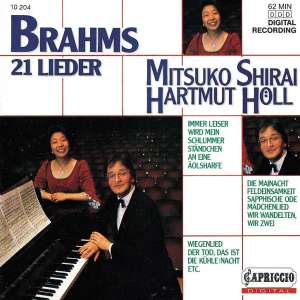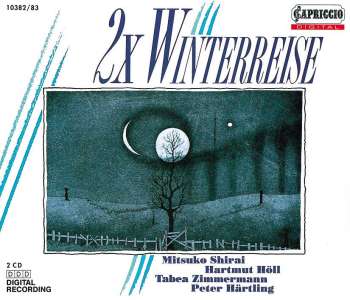Lieder's Dynamic Duo

BENJAMIN IVRY features Mitsuko Shirai and Hartmut Holl
<< Continued from page 3
 The reader will notice that I refer as much to Holl as to Shirai in
this article. This is one of the rarer virtues of their recordings. Listeners
do not get a sense that one person is 'deferring' to the other, as in so
many recordings where the pianist is afraid to offend, as Gerald Moore
codified for ever by asking 'Am I Too Loud?' Holl is never too loud but
can be as loud as the music invites him to be. Thus in their Brahms recording
from 1987, there is a real sense of dual effort, with Shirai's voice of
particular beauty and radiance in this repertoire. Her intensity in the
song, Der Tod, das ist die kuhle Nacht, is but one highlight. Heine
describes utter lassitude, followed by mention of a nightingale perching
on a branch outside the poet's bedroom window. Brahms' song is a masterpiece
of intensity, but never have I heard the thrilling effect Shirai obtains
when describing how the bird 'sings loudly of love'. Likewise, in a Brahms'
song like Feldeinsamkeit, also a meditation on nature and the solitude
of the individual. Shirai makes a personal impression of great force. No
doubt her own devotion to the countryside makes up part of the message,
but performance at this level seems to transcend the artist, and reach
something eternal. Admirers of Dame Janet Baker in this repertoire might
be advised to listen to how an impassioned pianist makes for unforgettable
results on this CD.
Like Baker, Shirai's admirable sobriety can refresh familiar material
like Schubert's Die junge Nonne, which is featured on a 1988 Schubert
CD. Here the Shirai-Holl duo offer nothing of the quaint Biedemeyer possibilities
of the song, giving us instead a message of passionately convincing religious
dedication. When the subject is human passion, as in a 1989 Liszt CD with
songs like Es muss ein Wunderbares sein and Freudvoll und leidvoll,
the message is equally direct. And Liszt himself is redeemed as a lieder
composer, underrated despite fascinating early efforts by Bernac and Poulenc
to popularize his songs.
 In 1991 the Shirai-Holl duo produced one of their most intriguing achievements,
'2 X Winterreise', with one CD of Schubert's great song cycle, and another
of the music played by Holl and violist Tabea Zimmermann, with Muller's
poems read by Peter Hartling. Holl chooses his collaborators with care,
and favors those who share his interest in endless rehearsals and dedicated
continuity. Tabea Zimmermann is one of the most sensational string talents
on the European scene, with a creamy tone that has caused her to be called
the Kathleen Ferrier of viola players. She has worked for many years with
the Shirai-Holl duo and in 1995 released a CD of somewhat rare repertory
for voice, viola, and piano. Tabea Zimmermann's playing of Schubert's melodies
is therefore of high interest, and the exercise of presenting the poems
and songs minus voice, artistically valid. Shirai and Holl explained that
their intention was to restore the strangeness to Schubert's tragic cycle.
So many Winterreise recordings have appeared in recent years it
seems the only artists not offering their own versions are Luciano Pavarotti
and Vanessa Mae. However, that might happen one day. The idea was to remove
Schubert songs from their familiar context as monuments of music, giving
them their angst-ridden original feeling. For this, Holl achieved an intense
performance that I would liken to the quick march to Calvary that opens
Hermann Scherchen's magnificently odd recording of Bach's St. Matthew
Passion.
Questions of how fast or slow music masterpieces should be performed
usually neglect the essential question of expressivity. Those who criticized
Scherchen's fast tempos -- and they included singers on his recording like
tenor Hugues Cuenod -- may have been unaware of Albert Schweitzer's admonition
that the Passion's opening chorus should reflect the brutal speed of a
prisoner's march and not a cosy or comfortable chorale. In a similar fashion,
by presenting Schubert's existential victim on his road to the void, the
Shirai-Holl interpretation reaches emotional and dramatic levels rarely
matched anywhere. Apart from the Pears/Britten Winterreise, there
is also the Ian Partridge/Richard Burnett version on Amon Ra. And
a late recording by Aksel Schiotz as a baritone, for its expression of
pain and anguish, although the Schiotz estate refuses to reprint this document
because the singer's voice in his last years was marred by illness. Shirai,
by contrast, is in full vocal flower, and engineer Teije van Geest outdoes
himself in capturing the voice and piano with uncanny vividness.
Continue >>
Copyright © 19 March 2000 Benjamin Ivry,
New York, USA
|